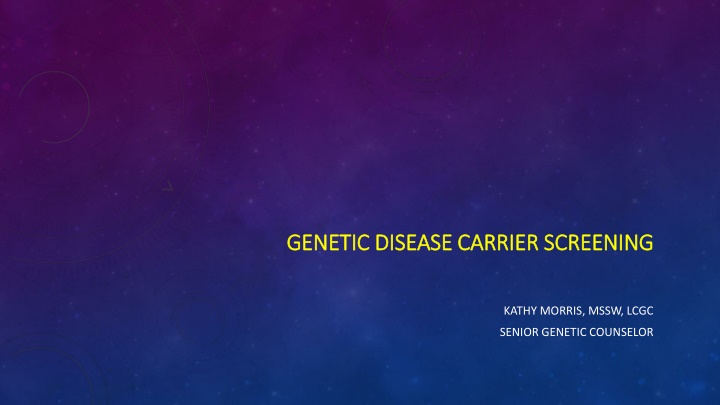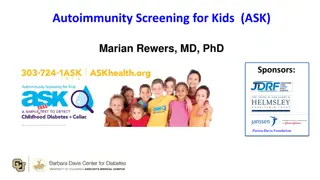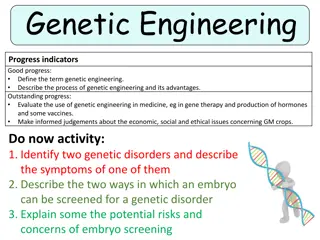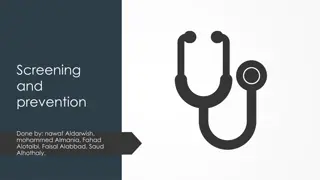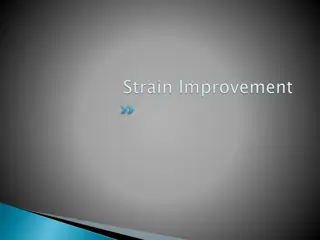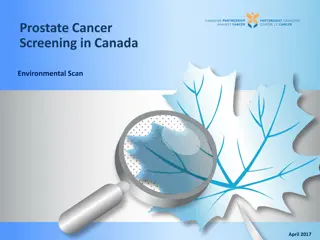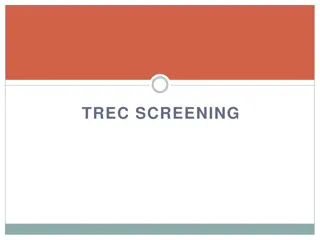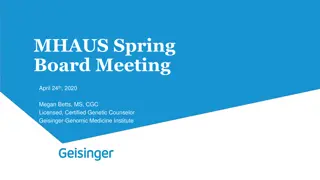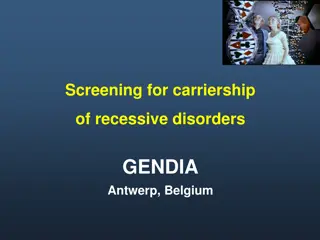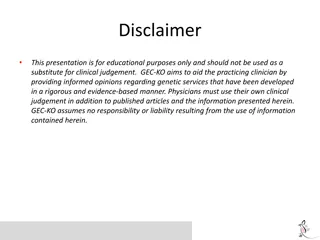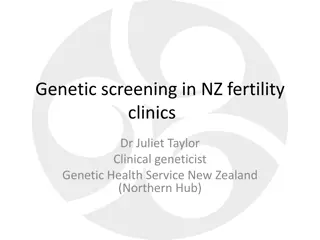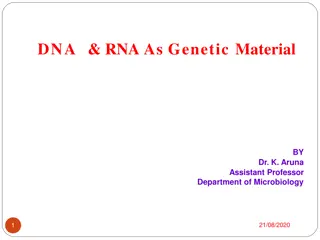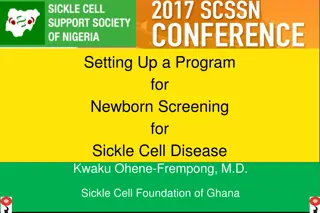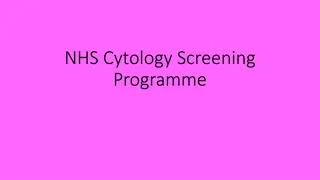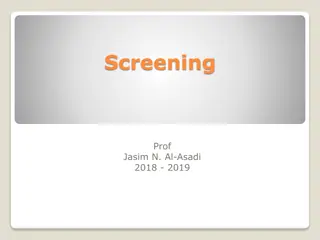Genetic Disease Carrier Screening Scenarios in Clinical Practice
Explore real-life cases involving genetic disease carrier screening in diverse patient populations, including considerations for testing based on ancestry, family history, and prenatal care. Learn about the significance of carrier screening, current guidelines, and the role of genetic counselors in facilitating informed decision-making.
Download Presentation

Please find below an Image/Link to download the presentation.
The content on the website is provided AS IS for your information and personal use only. It may not be sold, licensed, or shared on other websites without obtaining consent from the author.If you encounter any issues during the download, it is possible that the publisher has removed the file from their server.
You are allowed to download the files provided on this website for personal or commercial use, subject to the condition that they are used lawfully. All files are the property of their respective owners.
The content on the website is provided AS IS for your information and personal use only. It may not be sold, licensed, or shared on other websites without obtaining consent from the author.
E N D
Presentation Transcript
GENETIC DISEASE CARRIER GENETIC DISEASE CARRIER SCREENING SCREENING KATHY MORRIS, MSSW, LCGC SENIOR GENETIC COUNSELOR
OBJECTIVES OBJECTIVES Know current ACOG guidelines about genetic disease carrier screening Name 3 ethnic-specific genetic diseases Know how to order or arrange carrier screening Understand the role of a genetic counselor in facilitating carrier screening
CASE 1 CASE 1- -ALICIA ALICIA Alicia is a 24 year old G2P1 who is here for her first OB visit. She has African American and Hispanic ancestry. She is unaware of any family history of sickle cell disease. The father of the pregnancy is Hispanic from Cuba. Do you offer or order any carrier testing? Why or why not? If yes, for what do you test her and what test(s) do you order?
CASE 2 CASE 2- -SARAH SARAH Sarah is a 32 year old G1 who presents for OB care. Her family history questionnaire reveals that she has Ashkenazi Jewish ancestry. She has no known family history of Tay Sachs or other Jewish genetic diseases. Her partner is of mixed northern European Caucasian ancestry. Do you order or offer any carrier screening? Why or why not? If yes, for what do you test her?
CASE 3 CASE 3- -JENNIFER JENNIFER Andrea is a 32 year old who comes for a well-woman exam. She and her partner are thinking about having a baby. She is of non-Jewish northern European Caucasian ancestry and the partner is of Native American (Zuni) heritage. She requests cystic fibrosis carrier testing. Do you think she needs CF carrier screening? If yes, do you think she should be tested now or wait until she s pregnant? Why? If yes, do you just test her, or test her and her partner at the same time?
CASE 4 CASE 4- -SANDRA SANDRA Sandra is a G3P2 woman who comes for her first prenatal visit. She is of Chinese ancestry, as is her husband. She has a history of anemia, previously treated with iron, but not re-evaluated after therapy. Do you order or offer her any carrier screening for genetic diseases? Why or why not? If yes, for what do you screen her?
CASE 5 CASE 5- - ASMAE ASMAE Asmae and Ahmad are expecting their third baby, though it s the first time you ve seen them for care. They are Lebanese and are first cousins. The other two children are healthy. There is no known family history of genetic disease. Do you order or offer any carrier screening? Why or why not? If yes, what do you test for?
CARRIER SCREENING CARRIER SCREENING Decisions about carrier screening historically based on ethnicity It is becoming increasingly difficult to assign a single ethnicity to individuals * Professional organizations offer limited guidance * 2011 Update: ACOG Committee on Genetics Opinion CF Carrier testing
ACOG RECOMMENDATIONS ACOG RECOMMENDATIONS CYSTIC FIBROSIS CYSTIC FIBROSIS 2001: ACOG and ACMG guidelines for prenatal and preconception carrier screening for CF Offer to Non-Hispanic Caucasians and people of Ashkenazi Jewish ancestry Panel of 25 known disease-causing mutations Should be made available to all women of childbearing age, regardless of ethnicity. 2011 Update: ACOG Committee on Genetics Opinion: Offer CF screening to all women of reproductive age. increasingly difficult to assign a single ethnicity to individuals. CF screening is most efficacious in the non-Hispanic white and Ashkenazi Jewish populations.
ACOG RECOMMENDATIONS* ACOG RECOMMENDATIONS* ASHKENAZI ASHKENAZI JEWISH JEWISH RECOMMEND SCREENING FOR Tay Sachs disease Cystic fibrosis Familial dysautonomia Canavan disease 1/30 1/30 1/30 1/40 Before conception or during early pregnancy May be necessary to screen both partners simultaneously * ACOG Committee Opinion, October, 2009
ACMG RECOMMENDATIONS ACMG RECOMMENDATIONS ASHKENAZI ASHKENAZI JEWISH JEWISH Gaucher disease, Type I 1/18 Tay Sachs disease 1/30 Familial dysautonomia 1/30 Canavan disease 1/40 Niemann-Pick syndrome, Type A 1/90 Bloom syndrome 1/100 Mucolipidosis IV 1/130
POPULATION SCREENING GUIDELINES* POPULATION SCREENING GUIDELINES* The disorder impairs health in the homozygous affected offspring. There is a high frequency of carriers in the screened population. Technically and clinically valid screening methods are available and cost effective to all. IVF, prenatal diagnosis, and termination are reproductive options. Consent (informed and voluntary participation) is obtained. Potential benefits and risks of carrier testing are communicated before and after the test. Privacy is protected. Stigmatization of the carrier by the community is minimized. Experienced professional resources are available. *NHGRI conference on population carrier screening, 2008
CARRIER FREQUENCY CARRIER FREQUENCY Certain diseases/gene mutations are more prevalent in certain populations, but they do occur in others* TAY SACHS DISEASE CARRIER 1/30 of Ashkenazi ancestry 1/50 Irish ancestry (?) 1/53 French Canadians 1/300 non Ashkenazi Ancestry Based Carrier Screening, NSGC, 2005
CARRIER FREQUENCY CARRIER FREQUENCY Certain diseases/gene mutations are more prevalent in certain populations, but they do occur in others* CYSTIC FIBROSIS CARRIER 1/13 Zuni Native American 1/25 northern European Caucasians 1/30 Ashkenazi Jewish 1/50 Hispanic 1/65 African American 1/90 Asian American * Ancestry Based Carrier Screening, NSGC, 2005
CARRIER FREQUENCY CARRIER FREQUENCY Certain diseases/gene mutations are more prevalent in certain populations, but they do occur in others* HEMOGLOBINOPATHIES 1/10 from Jamaica or Haiti has sickle cell (S) trait 1/10 African Americans has thalassemia trait , 1/12 has S trait, 1/33 Hb C trait 1/42 Cubans has S trait 1/67 from Mexico have S trait 1/120 Caucasians has S trait 1/20 people of Mediterranean ancestry has thalassemia trait 1/30 Chinese have thalassemia trait, 1/20 have thalassemia trait * Ancestry Based Carrier Screening, NSGC, 2005
CARRIER SCREENING CARRIER SCREENING Some diseases occur with equal frequency across ethnic groups Spinal Muscular Atrophy 1/40 1/60 across ethnicities Glycogen Storage Diseases 1/75 Wilson s disease 1/86 Fragile X syndrome 1/260 women carries a FraX pre-mutation
SYMPTOMATIC CARRIERS SYMPTOMATIC CARRIERS SICKLE CELL TRAIT Propensity to urinary tract infection in women* Gross hematuria** Splenic infarction with altitude hypoxia or exercise** THALASSEMIA TRAIT mild microcytic anemia, does not respond to iron FRAGILE X Premature ovarian failure 15-20% Fragile X tremor-ataxia syndrome 5-10% IJOG, 2006, 92, 128-129 ** Oman Medical Journal, Jan. 2010; 25 (1), 3-8
WHEN TO SCREEN? WHEN TO SCREEN? Ideally done prior to conception Couples at risk can make decisions about whether or not to become pregnant, or to use alternative reproductive strategy Prenatal diagnosis Sperm donor Ovum donor Preimplantation genetic diagnosis (PGD) Adoption Remain childless
WHOM TO OFFER SCREENING? WHOM TO OFFER SCREENING? ANYONE! Most are autosomal recessive diseases Carriers are usually asymptomatic We all carry several gene mutations which could lead to serious illness in our children Most children with autosomal recessive diseases are born to couples with no family history Useful for consanguineous couples with no family history Do not just consider screening in someone with a family history *Thompson and Thompson, Genetics in Medicine, 2007, pp. 122-124
CARRIER TESTING CARRIER TESTING- -WHAT KIND OF TESTING? WHAT KIND OF TESTING? Molecular genetic testing, in which gene mutations are sought Excellent for ethnic-specific mutations Can be expensive Biochemical or other testing-preferable in some cases, often less expensive Hexosaminidase A assay: Tay Sachs screening for non-Ashkenazi Hemoglobin electrophoresis and CBC for hemoglobinopathies
SCREENING ALGORITHM FOR HEMOGLOBINOPATHIES* *Ancestry Based Carrier Screening, NSGC, 2005
ONE DISEASE OR MANY? ONE DISEASE OR MANY? Depends on cost and family s desires Molecular genetic testing (sequencing or targeted mutation testing) for a single disease can be expensive More economical to screen for many diseases at once
CARRIER TEST PANELS CARRIER TEST PANELS- - ASHKENAZI ASHKENAZI JEWISH JEWISH Emory JScreen 20 diseases $ 600 or $1000 Progenity AJ Nxt Complete 38 diseases $400-$600 Integrated Genetics Inheritest select ~90 diseases $850 Tricore CF only 1 disease $600 LABS OFTEN OFFER DISCOUNTS FOR SELF-PAY OR FINANCIAL HARDSHIP
CARRIER TEST PANELS CARRIER TEST PANELS PAN-ETHNIC/UNIVERSAL Counsyl 101 diseases, can customize $99-$299 with insurance Emory >140 diseases 2 tiered $600 or $1000 Integrated Genetics Inheritest, ~90 diseases $950 Natera Horizon 38 diseases $100-$200 pt cost GenPath, InheriGen, 160 disorders $395-$495 Pathway Genomics, > 70 AR diseases Would not disclose price Progenity, 3 diseases $200-$300 LABS OFTEN OFFER DISCOUNTS FOR SELF-PAY OR FINANCIAL HARDSHIP
ROLE OF GENETIC COUNSELOR ROLE OF GENETIC COUNSELOR Familiar with ethnic-related genetic diseases Skilled at patient education, exploring patient desires and priorities Familiar with how to order tests for rare genetic diseases Familiar with financial arrangements from various labs Able to devote time to detailed discussion Just put a referral in ad hoc
REFERRAL FOR GENETIC COUNSELING REFERRAL FOR GENETIC COUNSELING Ad hoc Women s Ultrasound OB Check Genetic Counseling Menu comes up
CASE 1 CASE 1- -ALICIA ALICIA Alicia is a 24 year old G2P1 who is here for her first OB visit. She has African American and Hispanic ancestry. She is unaware of any family history of sickle cell disease. The father of the pregnancy is Hispanic from Cuba. Do you offer or order any carrier screening? Why or why not? If yes, for what do you test her and what test(s) do you order?
CASE 2 CASE 2- -SARAH SARAH Sarah is a 32 year old G1 who presents for OB care. Her family history questionnaire reveals that she has Ashkenazi Jewish ancestry. She has no known family history of Tay Sachs or other Jewish genetic diseases. Her partner is of mixed northern European Caucasian ancestry. Do you order or offer any carrier testing? Why or why not? If yes, for what do you test her?
CASE 3 CASE 3- -JENNIFER JENNIFER Andrea is a 32 year old who comes for a well-woman exam. She and her partner are thinking about having a baby. She is of non-Jewish northern European Caucasian ancestry and the partner is of Native American (Zuni) heritage. She requests cystic fibrosis carrier testing. Do you think she needs CF carrier screening? If yes, do you think she should be tested now or wait until she s pregnant? Why? If yes, do you just test her, or her and her partner at the same time?
CASE 4 CASE 4- -SANDRA SANDRA Sandra is a G3P2 woman who comes for her first prenatal visit. She is of Chinese ancestry, as is her husband. She has a history of anemia, previously treated with iron, but not re-evaluated after therapy. Do you order or offer her any carrier screening for genetic diseases? Why or why not? If yes, for what do you screen her?
CASE 5 CASE 5- - ASMAE ASMAE Asmae and Ahmad are expecting their third baby, though it s the first time you ve seen them for care. They are Lebanese and are first cousins. The other two children are healthy. There is no known family history of genetic disease. Do you order or offer any carrier screening? Why or why not? If yes, what do you test for?
QUESTIONS? COMMENTS?
